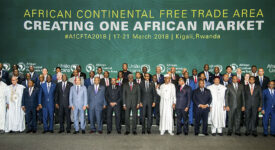Morocco’s Industry Minister, Moulay Hafid El Alamy, presented his idea of a new industrial policy to King Mohammed VI in Casablanca on Wednesday (April 2). He said that the country’s industry “will now have necessary resources to match their ambitions, to raise their game, and to develop and reach out on the global stage”. The main goal of this newly-proposed policy is job creation with the target of a million jobs to be created by the end of 2020. The job creation should be driven by foreign direct investment and a brushed-up national industrial agenda.
As a result, the industrial policy for 2014-2020 will witness several changes. The so-called National Industrial Accelerator Program will be given new dynamics, which will also define the new relationship between small and medium-sized enterprises (SMEs) and large companies. Moreover, the new agenda should also enhance the position of Moroccan industrial sector as the most important driver of job creation, in particular, among young people and fresh graduates. It is also expected that the new policy will generate a better exploitation of economic and social benefits of public spending aimed to help the industry.
The most vital goals will include boosting activities from the informal sector into the mainstream along with a launch of a comprehensive system for the integration of very small businesses. The proposal also plans to sort out the core issue of matching between skills and the needs of the market. In order to back up all of these goals, the government is about to release about 1,000 hectares of public land at disposal to industrial estates.
As to the financial side of the program, the banking sector has been asked to help by offering active support to the industry. This will encompass also reworking of the system of public underwriting for SMEs. Moreover, by 2020 the government will have also created a public industrial investment fund at the cost of about 20 billion dirhams (1.8 billion euros).
Article Tags:
Casablanca · Industrial Policy · investment · MHE · Mohammed VI · Morocco · Moulay Hafid El Alamy






